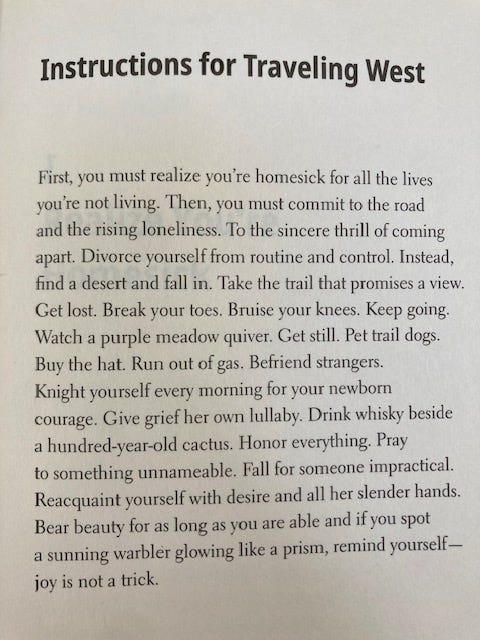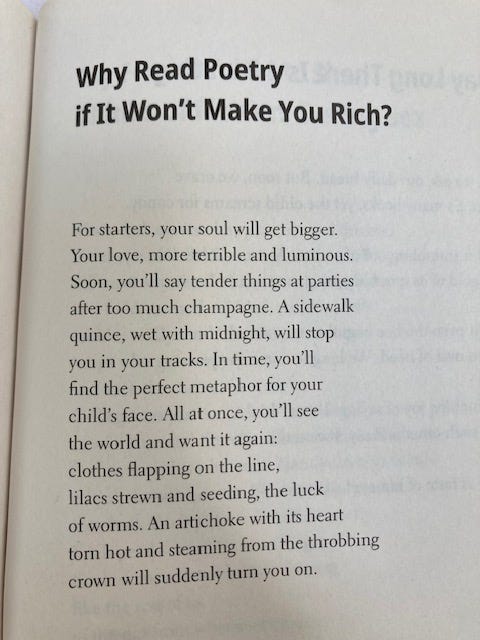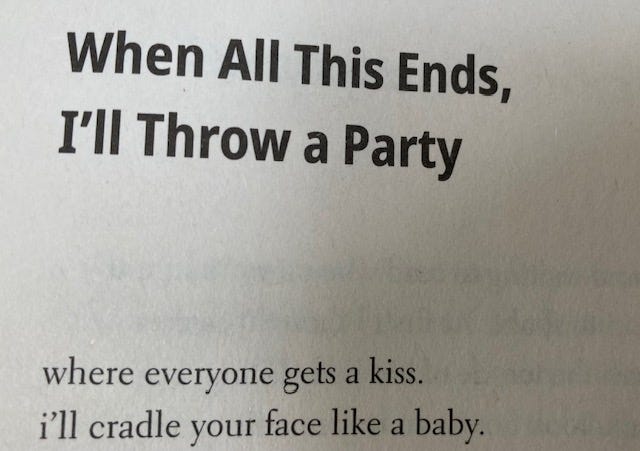Can a poetry book be a guide for changing your life?
Our April book club review / discussion post
Ah my friends, where to start with our fourth book club choice of the year - Instructions for Travelling West by
.Well, firstly by thanking you for making me accountable to start and FINISH more poetry books. I’ll admit, I started this one, felt like I was well on my way with it, then put it back down. That’s no reflection on the book. I just had a couple of weeks school holidays and I was also reading a few fiction books that snaffled my attention (in a good way).
Luckily, this is the sort of poetry book you can binge (if such a thing should ever be encouraged with poetry? There will probably be some who say no, what with poetry policing being quite prevalent in a way that doesn’t seem to happen with fiction?)
Either way, truth is I read the second half in about a day.
Here’s my review and for those who haven’t read this month, a couple of poems to wet your appetite. Looking forward to hearing your thoughts in the comments…
The book opens with a poem that has been widely shared, so I will do the same. This is ‘Instructions for Travelling West’ -
Oh-my-goodness, this is such a great poem isn’t it?
It’s placement right at the beginning of the book wasn’t a surprise. If you were wondering what this book is about - this - it is about this. Actually, this piece is used as a sort of prologue to the book, not actually within the first section. I guess it is the poetry equivalent of an introduction by the author but it also serves as a guidebook, a manual, which had the effect of making me feel reassured as a reader. Here is an author who has figured some shit out - you know the rest of the book isn’t going to be straightforward but you also feel like you’re not gonna end up completely lost and left alone. And I never did.
The book then continues the journey from, ‘realising you’re homesick’ towards finding yourself again, all the time using lines from this opening poem as ‘section headings’.
I actually found myself referring back to these section headings sometimes, perhaps wondering why a certain poem might be suited to one particular step of the journey. Did that feel like a constraint? I don’t think so. I quite like to know where I stand, but that’s probably a personal thing.
I guess then the whole book could be viewed as being ‘instructional’ in style (there are poems titled, ‘Submit,’ ‘Feast’ and ‘Yearn,’) but it never felt like I was being told what to do. Not in a negative way anyway. The storytelling throughout is hypnotic and highly emotive, the descriptions and images draw you in. You’re invited to join in the journey and consider your own in the process.
And this is one hell of a journey. It’s a big one. It’s not a quiet ‘coming of age’ story but rather a launch pad into the unknown. It is hot and sticky and glutinous. It is rich with smells and colours - ‘rob-you-blind’ reds, ‘speck(s) imbued with blue’ and the ‘endless chop of green.’ This is a woman learning to take up space and I think the rich, at times extrovert language celebrates that. That doesn’t mean that it’s not tender, there are poems that brought tears to my eyes, but it doesn’t hold itself back. It arrives on a plate (there are tons of food references: ‘sweet buttercream,’ ‘slurp(ed) oysters,’ ‘ripe summer pears’) and invites you to take a bite.
My favourite section was, ‘Reacquaint Yourself With Desire.’ I don’t know if that’s because women’s wants are rarely written about so openly, or just because it contains some stunning individual poems. The ones in this section just ooze passion and unabashed lust. Plus it also contains one of my favourite
poems (below). If anyone can find a sexier description of why poetry is so damn brilliant I’d be keen to hear it:The style of poetry in this book is fairly consistent. Especially compared to the other poetry books we’ve read so far this year (all can be found here btw). There are some poems that I imagine would fall under the category of prose poetry. Most are confessional. The majority fit onto a single page. But the themes do shift and surprise - there’s a series of ten poems (an entire section) that reference the bible and Eve. The road may be travelled but it’s not a linear experience. Almost like flicking through a film of photographs, the memories seem to arrive and dissipate, they zoom in and out of focus.
There’s a reoccurring technique where the title works as a first line for the poem which gives the effect of it appearing conversational, as well as fluid. There’s that constant feeling of movement and informality:
I’ve never tried this myself when writing a poem and it made me want to.
These are not poems that stretch in terms of understanding, I never thought, “what on earth is going on here?” which believe me, happens a fair amount when I read poetry! But that doesn’t mean they are without layers, there are many. And nor does it mean they are simple, or easy to write.
manages to makes them appear simple sometimes.And isn’t that the hardest thing to achieve as a writer!?
Who would I recommend reads this book?
Anyone who is interested in poetry that digs into your soul and asks what it takes to make a life flourish. Including luck! Anyone who enjoys brilliant storytelling and masterful use of the metaphor. Anyone who likes a tale of reinvention and enjoys poetry that can be picked up easily and read while sat on the side of a train station (or the like).
It would be also a great book for anyone who has recently started reading poetry because it is technical enough to swoon over but still entirely accessible. And I liked the look of the cover too, incidentally.
Yep, really liked this one. Happy with this having been finished and enjoyed as part of our year of twelve (or whatever your number) poetry books read cover-to-cover in 2025.
How about you? Have you read it? If not, what do you think of the poems above?
A few questions, if you like that sort of thing:
Can a poetry book be a guide for changing your life? What was your over-riding feeling having read the book? Did it instigate anything in you? Prompt you to make any of your own changes?
There are six poems spread throughout the book with the title, ‘Luck’. I found myself reading back over them as a series. What do you think
is suggesting to us through these? And do you think she achieved her aim?A lot of the poems are written in first person and share very personal experiences. I’ve heard it said that poetry should remain open enough that the reader can insert their own meaning. I still found myself able to do so. What were your thoughts?
I’d love to know your thoughts on the first question in particular!
Nelly xx








Thank you for this overview, Nelly. I started this book a few months ago, was taken in by the rich images (that's what I remember best of what I read), and then got distracted (also by fiction). I'm not the most consistent poetry-reader but I'm trying to change that.
I grapple with that last bit you shared--"I’ve heard it said that poetry should remain open enough that the reader can insert their own meaning." This isn't something I struggle with when I read poetry. I love (prefer?) the specifics. But I know that a broader audience is reached (I think?) with more open poems. I don't know. I mean, obviously there's room for both kinds of poems, and both kinds are so beautiful and necessary. I think I just worry sometimes that I don't know how to write "open" poems without sanitizing out everything that makes the poem important to me, if that makes sense.
I collected my copy from my local bookseller just yesterday. It took a while to arrive here in Germany! But just a quick note to say thank you Nelly - I am binging! The first section Realise You’re Homesick is so evocative of child memories - reminding me of swimming in summer ‘until it gobbled me whole’. The stirring image of Mendelssohn the pet monkey pulled at my heartstrings and prompted reflections on lost decisions that could have been made. Thank you so much for introducing Joy Sullivan to me.